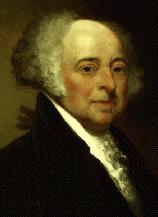October 30: John Adams
John Adams (1735)
It was on this date, October 30, 1735, that the second president of the United States, John Adams, was born in Braintree (now Quincy), Massachusetts. He graduated from Harvard, where he first intended to study for the orthodox ministry, but the reality of orthodoxy sobered him and he turned to the law. Adams was admitted to the bar in 1758 and married Abigail Smith, daughter of the minister of Weymouth, in 1764. In explaining why he changed course of career, Adams later wrote,
People are not disposed to inquire for piety, integrity, good sense or learning in a young preacher, but for stupidity (for so I must call the pretended sanctity of some absolute dunces), irresistible grace, and original sin.[1]
He was a member of the first Continental Congress, a signer of the Declaration of Independence, Minister to France, Holland and England, and the first Vice President before becoming the second President. As a member of the Massachusetts constitutional conventions of 1779 and 1820, he fought to separate church and state, but failed. As President, he signed the Treaty with Tripoli, which states in Article 11, "The Government of the United States is not in any sense founded on the Christian religion." The treaty was ratified by the Senate in 1797 without dissent.
One of the most cultivated of the revolutionaries, Adams was inspired by French and English Deistic literature. Unlike his friend Jefferson, he was not a dogmatic Materialist, but he was just as contemptuous of Christianity and was almost an Agnostic. Unlike George Washington, his predecessor as President, Adams was not circumspect in his religious opinions, proclaiming theistic belief, but not orthodoxy: "The doctrine of the divinity of Jesus has made a convenient cover for absurdity," he wrote. To Jefferson in 1817 he wrote:
Twenty times in the course of my late readings, have I been on the point of breaking out, 'This would be the best of all worlds if there were no religion in it!' But in this exclamation I should have been as fanatical as Bryant or Cleverly. Without religion, this world would be something not fit to be mentioned in polite company — I mean hell. So far from believing in the total and universal depravity of human nature, I believe there is no individual totally depraved. The most abandoned scoundrel that ever existed never wholly extinguished his conscience, and while conscience remains there is some religion. ...[2]
The friendship between Adams and Jefferson broke down over political differences, but was mended by Abigail Adams, so that the two corresponded frequently, and often on the subject of religion. In an 1825 letter to Jefferson, Adams calls the doctrine of the incarnation an "awful blasphemy" and thought the First Cause could be defined non-theologically, "whether we call it Fate or Chance or God."[3]; in an 1820 letter he defined God as "an essence that we know nothing of" and believed that efforts to further define God were "a game of push-pin."[4]
After Adams' wife died in 1818, Jefferson wrote Adams a letter of sympathy, to which Adams the Deist responded with the hope, if not the certainty, of immortality:
I do not know how to prove physically, that we shall meet and know each other in a future state; nor does Revelation, as I can find, give us any positive assurance of such a felicity. My reasons for believing it, as I do most undoubtedly, are that I cannot conceive such a being could make such a species as the human, merely to live and die on this earth. If I did not believe in a future state, I should believe in no God.[5]
Adams himself died on the same day as Thomas Jefferson. He was 91 years old on 4 July 1826.
[1] The Works of John Adams, 10 vols. 1856, vol. 1, p. 37.
[2] Works, vol. 10, p. 254.
[3] Letter; Adams to Jefferson, 22 January 1825, in Works.
[4] Letter; Adams to Jefferson, 17 January 1820, in Works.
[5] Works, vol. 10, pp. 362-363.
Originally published October 2003 by Ronald Bruce Meyer.


